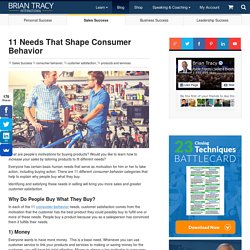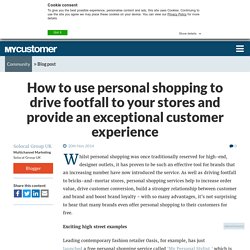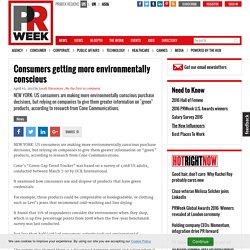

21 10 14 oxfordstreet. 11 Needs That Shape Consumer Behavior. What are people’s motivations for buying products?

Would you like to learn how to increase your sales by tailoring products to fit different needs? Everyone has certain basic human needs that serve as motivation for him or her to take action, including buying action. There are 11 different consumer behavior categories that help to explain why people buy what they buy. Identifying and satisfying these needs in selling will bring you more sales and greater customer satisfaction. Why Do People Buy What They Buy? In each of the 11 consumer behavior needs, customer satisfaction comes from the motivation that the customer has the best product they could possibly buy to fulfill one or more of these needs. 1) Money Everyone wants to have more money. 2) Security Each person has a fundamental need for security. 3) Being Liked Consumer behavior dictates that everyone wants to be liked by others. 4) Status and Prestige 5) Health and Fitness Everyone wants to live a long time and enjoy great health.
How to use personal shopping to drive footfall to your stores and provide an exceptional customer experience. Whilst personal shopping was once traditionally reserved for high-end, designer outlets, it has proven to be such an effective tool for brands that an increasing number have now introduced the service.

As well as driving footfall to bricks-and-mortar stores, personal shopping services help to increase order value, drive customer conversion, build a stronger relationship between customer and brand and boost brand loyalty - with so many advantages, it’s not surprising to hear that many brands even offer personal shopping to their customers for free. Exciting high street examples Leading contemporary fashion retailer Oasis, for example, has just launched a free personal shopping service called ‘My Personal Stylist,’ which is designed to guide a potential customer from initial research (most likely online) to purchasing products in store.
The importance of real-time booking For the customer, real-time booking services offer a drastically improved experience. Your Business Matters - Key consumer trends for 2016 that businesses need to be aware of. Are consumers becoming more aware of environmentally sound business? Hannah Coles of E4 Environment explains how third party accreditation can help your business avoid the 'greenwash' trap Shoppers are more aware now than ever of the ethical and environmental impact of goods and services.

With a new agenda that factors in the sustainability of businesses it's telling that, according to the Ethical Consumerism Report 2012, 50 per cent of consumers surveyed have avoided a product based on a company's responsible reputation. It's more noticeable than ever that organisations large and small have started using their environmental practices as a marketing tool so, from supermarkets to your local coffee shop, there are green claims everywhere. Although it is not necessarily the case that well informed consumers will make the ‘right' choice, there is evidence to suggest that consumers are reacting more strongly to businesses that disregard environmental and ethical concerns. So how can businesses make the most of their environmental practices to attract custom? Consumers getting more environmentally conscious.
NEW YORK: US consumers are making more environmentally conscious purchase decisions, but relying on companies to give them greater information on “green” products, according to research from Cone Communications.

Cone's “Green Gap Trend Tracker” was based on a survey of 1,068 US adults, conducted between March 7-10 by OCR International. It examined how consumers use and dispose of products that have green credentials. For example, these products could be compostable or biodegradable, or clothing such as Levi's jeans that recommend cold-washing and line drying. It found that 71% of respondents consider the environment when they shop, which is up five percentage points from 2008 when the five-year benchmark survey was last conducted. Just less than half (45%) of consumers actively seek out environmental information about the products they buy. The survey also showed there is a disconnect between intent and action when it comes to the consumer's role in the product lifecycle. What motivates consumers to make ethically conscious decisions? There is a hunger for information from companies that are seeking to understand how to build their businesses on the back of being more sustainable.

Major brands in particular say they are keen to build trust in their products by becoming more environmentally and ethically conscious but are prepared only to invest if they can see it will add to the bottom line. But while there is an enormous body of knowledge on how to encourage customers to consume more, there remains far less understanding about what motivates them to make more ethical choices, especially during what is likely to be a prolonged period of economic austerity. This is why new ethical living research conducted in the UK by YouGov, and replicated by Guardian News & Media (GNM) among its own panel of readers, makes interesting reading.
One source of optimism comes from confirmation that the economic downturn has not dented people's desire to minimise their impact on the environment and their spend on ethical products.